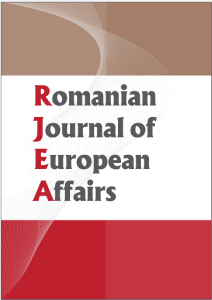Regional and Cohesion Policy – The Crossroads of EU Sectoral Policies
Alina Bârgăoanu, Loredana Călinescu
Abstract:
The article reviews the main theories of development in order to provide a solid background to discuss one of the most important EU policies – the Regional and Cohesion Policy. Firstly, its weight is given by the fact it represents EU’s major development policy, by means of which the EU decision-makers have tried to maintain a balanced growth. Secondly, its special relevance is due to the fact that it represents „a spatial combination of a variety of sectoral policies“ (Hooghe, 1996, 10), a genuine crossroads where these sectoral policies meet. EU regions – the focus of Regional and Cohesion Policy – are testing grounds where sector-driven initiatives are tested, confirmed, invalidated, or improved. The new design of the policy is discussed in the context created by the global economic crisis that puts cohesion to a severe test. Just like other phenomena that we can witness today, the crisis only has enforced and strengthened pre-existing trends, among which the shift from convergence and cohesion towards competitiveness as such appears to be the most prominent one.
Keywords: competitiveness, development, EU Regional and Cohesion Policy, structural approach, structural policy
Competition and Regulation in the EU Energy Market
Cristina Havriş
Abstract:
Abstract. When prices are high and public service obligations are not properly fulfilled, consumers wonder if they obtain what they need from the market. In electricity and gas markets of the EU Member States, apart from the persistence of high, non-transparent regulated prices, a number of shortcomings have been identified by the European Commission, such as a less than optimal network use for energy transmission, a lack of coordination and cooperation across borders by transmission system operators and national authorities, and a lack of transparent and simple procedures for dealing with consumers’ complaints. These are the main elements of the infringement proceedings that the European Commission decided to launch on 25 June 2009 against 25 Member States for non–compliance with certain Community provisions in the Second Internal Energy Market Package, which entered into force on 1 July 2007. Quite emblematic is the fact that it occurred the same day as the adoption of the Third Internal Energy Market Package aiming to ensure a proper functioning of the EU energy market. We intend to analyse what has happened in the recent years at the EU level in order to liberalise and remove the significant remaining obstacles to competition in the energy market.
Keywords: competition, deregulation, energy market, Regulation, unbundling
Some Legal Aspects of Energy Security in the Relations between EU and Russia
Ovidiu-Horia Maican
Abstract:
The need for a sustainable, secure and competitive energy supply has long been recognized within the Community, and has been addressed on numerous occasions, notably in the Green Papers elaborated by the Commission in 2000 and 2006. Recent supply crises and rapidly escalating fuel prices have focused the minds of leaders across the European Union, as well as those of businesses and individual energy consumers. Energy policy transcends a range of different policy areas, including competition, transport, environment and energy itself. Decisions relating to energy policy in Europe are primarily within the remit of individual Member State governments, with the European Commission’s powers limited to two specific areas (creation of the European single market and matters relating to nuclear safety and security under the EURATOM Treaty). The extent of the transfer of powers towards Europe is clearly a critical decision point and in practice a sensitive balance is likely to be required between those matters for which the Commission should have responsibility and those where Member State governments retain sole authority. European officials are putting into evidence their belief that Europe’s energy predicament is acute and mention energy security as a priority issue for the Common Foreign and Security Policy. Policy commitments say that energy strategy must move beyond the internal sphere and become systematically a part of EU external relations. The Commission’s 2006 Energy Green Paper promised “a better integration of energy objectives into broader relations with third countries”.
Keywords: competition, energy, Energy Charter, energy security, gas, Russia, solidarity
The Czech Presidency of the EU Council: No Triumph, No Tragedy
Petr Kaniok, Hubert Smekal
Abstract:
The text firstly briefly introduces the Presidency as an instrument or tool of the decision-making process within the EU. The article further presents the basic potential criteria for evaluating an EU Council Presidency. Then the course of the Czech Presidency is described according to how it dealt with its functions. In the concluding analysis the Czech Presidency and perceptions of it are evaluated on the basis of the criteria set forth, and the conclusions are developed in the context of their importance for the function of the Presidency in general. Czech Presidency is introduced in the context of both internal and international politics and a special section is also devoted to very unfavorable media coverage of the Presidency. However, the condemnation it received especially from the French and German media was the result of secondary motives unrelated to the Presidency itself. The basic thesis of the text goes against ordinary media conclusions and states that the Czech Republic in carrying out the Presidency – in view of the style chosen – did very well, and fulfilled the basic function of the Presidency.
Keywords: Czech Presidency, EU Council, EU institutions, EU leadership
The Eastern Partnership – A Premise for an Enhanced EU-Eastern Neighbours Cooperation Relationship
Oana Mocanu
Abstract:
The enlargement of the European Union towards the Central and Eastern Europe has brought to attention the necessity to reshape the EU institutional framework and specific policies addressing its new neighbourhood. Repeatedly stating that the European Neighbourhood Policy (ENP) is not a preceding phase for membership, the European Union also embraced the Polish-Swedish initiative for an Eastern Partnership (EaP). Meant at first to counterbalance the Union for Mediterranean project, the EaP has developed into a distinct project, with specific and ambitious cooperation goals, a positive and constructive agenda meant to support six countries (Ukraine, Moldova, Georgia, Azerbaijan, Armenia and Belarus) develop and harmonize with the European standards and, at the same, attempting to build and further develop an Eastern dimension of the ENP. The questions of the efficiency of the conditionality derived from the EaP and also the complementarity of this initiative with other regional projects in the area can also be important matters of concern.
Keywords: conditionality, Eastern neighbours, Eastern Partnership, enlargement, European Neighbourhood Policy, regional initiatives
Where is the Difference? The Profile of the Romanian Candidates for the 2009 European Elections
Sergiu Gherghina, Mihail Chiru
Abstract:
Drawing on a complex dataset that includes the age, gender, education, public experience, party career, wealth, and the occupational background of all 215 candidates proposed by the five Romanian parties winning seats in the 2009 EP elections, this article devises an analytical framework for the candidates’ profiles. The study is valuable for those researching the professionalization of the EP along the convergence thesis, and for the legislative recruitment scholars interested in candidates’ qualities targeted by selectorates in a blocked-list PR setting, i.e., the significant differences between candidates receiving an eligible place and the rest. Our findings reflect the importance given by parties to previous experience in the EP and to wealth/capacity to contribute to the campaign costs and, at the same time, they emphasize the ambivalent educational trajectories of the candidates and the dominance on the lists of male politicians.
Keywords: eligibility, MEPs, patterns of recruitment, political profile, professionalisation






